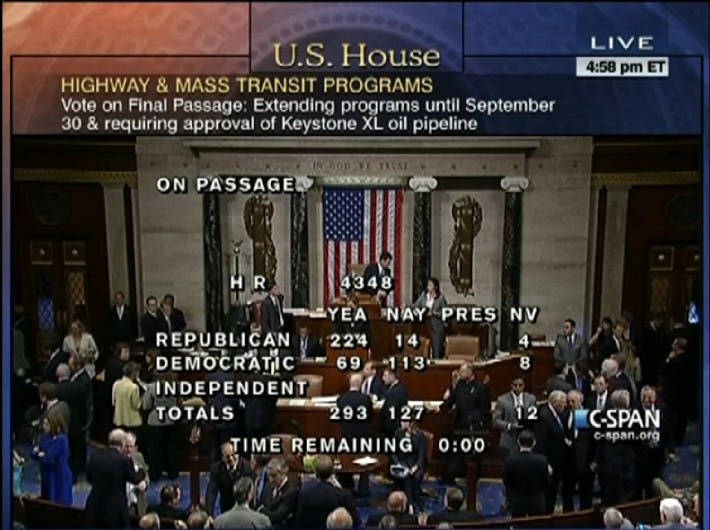In a brazen but expected display of defiance -- both of the President and of bipartisan efforts in the Senate -- the House voted today to extend transportation policy through the end of September with several contentious policy changes attached.
The bill, whose name (The Surface Transportation Extension Act of 2012, Part II) reads like the most boring action movie sequel of all time, passed by a vote of 293 to 127. Unlike the extension passed in March, which was a "clean" extension, this one is "dirty," muddled by non-transportation-related language requiring, among other things, speedy approval of the Keystone XL pipeline.
If signed into law, Part II would actually be the tenth extension of SAFETEA-LU since it first expired in 2009. But folding the pipeline back into the mix could make a needlessly drawn-out exercise in futility last even longer. President Obama had threatened to veto the House's original transportation bill, H.R. 7, over its inclusion of the Keystone pipeline, and he has renewed the threat for the current piece of legislation.
This new extension is simply an excuse to start the conference process with the Senate, and all the bells and whistles attached to it are just bargaining chips for the conference table. The bill carries two popular programs -- harbor maintenance and the RESTORE Act -- and a few unpopular ones -- Keystone XL, coal ash, and environmental streamlining -- into the conference room, while the Senate brings program consolidation and a longer timetable.
"The need for a transportation bill has been hijacked for political purposes," said Rep. Peter Welch (D-VT) from the House floor.
The conditions under which the extension was written and amended were just as contentious as the policy changes it contains. Only three amendments (out of nine) were allowed a vote by yesterday's Rules Committee hearing, all submitted by Republican congressmen, and all three were approved by the full House today.
A few of those amendments have significant environmental implications. Rep. Reed Ribble's (R-WI) amendment, which carries over measures from HR 7 gutting environmental review rules, drew the ire of environmental groups and many House Democrats. Rep. Peter DeFazio (D-OR) pointed out that some language in Ribble's amendment could be construed as allowing all highway projects to bypass federal environmental review altogether. Ribble's amendment passed with only 18 Democratic votes; one solitary Republican, Justin Amash, voted against it. (Two other amendments, requiring ports to spend more money on dredging and preventing the federal government from regulating toxic coal ash, passed without a recorded vote.)
Democrats on the House floor were clearly torn whether to support the bill. On one hand, finally appointing conferees would represent the first real sign of progress in a long time for this stop-and-go reauthorization fight. On the other hand, going to conference will almost certainly mean swallowing a poison pill planted by House leadership. In his remarks from the floor, Rep. Jerrold Nadler (D-NY) said that his desire to go to conference is outweighed by the riders weighing down the House bill, and that he would be voting "no."
President Obama, too, could be placed in an uncomfortable position if he is handed something that looks exactly like the Senate bill -- which he supports -- with the Keystone pipeline attached.
The Senate bill would expire at the end of September 2013, so House Democrats will want to go to conference as quickly as possible. (We wrote a little while ago about how every extension hurts the Senate bill.) "We're ready to go to conference later today," offered top transportation Democrat Nick Rahall.
The ball, for the first time since MAP-21 passed on March 14, is in the Senate's court.





